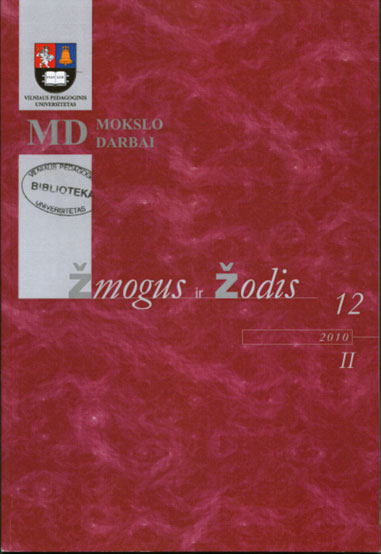Panegirizmo raiška XVIII amžiaus Lietuvos Didžiosios Kunigaikštystės lotyniškoje epigraminėje poezijoje
Expression of Panegyrics in the Latin Epigrammatic Poetry of the 18th Century Grand Duchy of Lithuania
Author(s): Asta VaškelienėSubject(s): Literary Texts
Published by: Vytauto Didžiojo Universitetas
Keywords: the Epoch of Enlightenment; Baroque literature; epigrams (Latin); Jesuit poetry; Lithuanian literature (Latin) of the 18th century; Lithuanian poetry (Latin).
Summary/Abstract: In this article, the peculiarities of Latin occasional panegyrics in the 18th c. Grand Duchy of Lithuania are analyzed based on collection of epigrams Celsissimo, illustrissimo […] Adamo Stanislao […] Grabowski, […] episcopo Varmiensi et Sambiensi published in Vilnius, 1762. The dedicatee, the prince of the Holy Roman Empire and Bishop, was a significant figure of political and cultural life of the time, educator, patron of arts and bibliophile. This collection of epigrams dedicated to Grabowski is also an excellent example of the relationship between occasional literature traditions and public mentality, some important social and cultural realia of the time. The article aims to disclose what is hidden behind such unsophisticated at first sight glorification of the dedicatee and how (also how much) the experience of his public activities is reflected in this literary text of occasional character. The article author makes a conclusion that epigrams in this collection are comparatively laconic panegyrics, and this was determined by both, the conventions of the genre and author’s literary taste and erudition. To express the laudation, the panegyric author uses Biblical parallels, a dialogue between personified characters and declinativum, the form of poesis artificiosa, which is the dedicatee’s personal name declension in the epigrammatic text. Apart from the literary means of expression, the panegyric also contains visual means, including the significant gradation of prince and bishop’s titles (the first title is published in larger letters thus emphasizing its meaningful priority).
Journal: Žmogus ir žodis
- Issue Year: 12/2010
- Issue No: 2
- Page Range: 11-16
- Page Count: 6
- Language: Lithuanian

